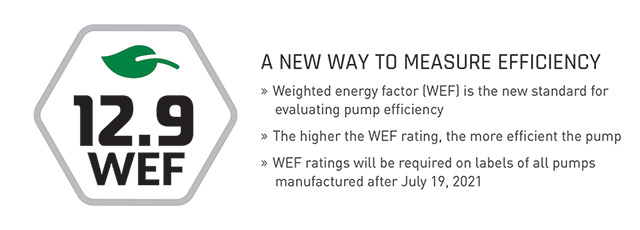Understanding Weighted Energy Factor (WEF) for Pool Pumps: Optimizing Energy Efficiency
Pool pumps are essential for maintaining clean and properly circulated water in swimming pools. However, traditional pool pumps can be energy-intensive, resulting in high electricity bills and environmental impact. To address this issue, the U.S. Department of Energy (DOE) has introduced the concept of Weighted Energy Factor (WEF) to measure the energy efficiency of pool pumps. In this article, we will explore the significance of WEF and how it can help pool owners optimize energy efficiency.
- What is Weighted Energy Factor (WEF)? The Weighted Energy Factor (WEF) is a metric used to quantify the energy efficiency of pool pumps. It takes into account various factors such as flow rate, motor efficiency, and power consumption to determine the overall energy efficiency of a pump. WEF ratings are standardized by the DOE, allowing consumers to compare and choose energy-efficient pool pumps that meet their specific needs.
- Calculating WEF: WEF is calculated by dividing the energy consumption in kilowatt-hours (kWh) by the volume of water pumped in gallons. The result is then multiplied by a correction factor to account for the actual operating conditions of the pump. The higher the WEF rating, the more energy-efficient the pump is, indicating lower energy consumption and reduced operating costs.
- Importance of WEF for Energy Efficiency: By considering multiple factors and operating conditions, WEF provides a more accurate representation of a pool pump’s energy efficiency compared to standalone metrics like motor efficiency or power consumption. It allows pool owners to make informed decisions when selecting a pool pump, ensuring optimal energy savings and reduced environmental impact.
- Benefits of Choosing High WEF-rated Pool Pumps: a. Energy Savings: Pool pumps with higher WEF ratings consume less energy while maintaining the required water flow and circulation. This results in significant energy savings and lower electricity bills over the lifespan of the pump.
- Environmental Impact: Opting for a high WEF-rated pool pump helps reduce carbon emissions and environmental footprint. By choosing energy-efficient pumps, pool owners contribute to a greener and more sustainable future.
- Cost Efficiency: While high WEF-rated pool pumps may have a higher upfront cost, their long-term energy savings offset the initial investment. Over time, the reduced energy consumption translates into cost efficiency, making them financially beneficial for pool owners.
- Compliance with Regulations: Some regions have specific energy efficiency regulations for pool pumps. By selecting a pump with a high WEF rating, pool owners ensure compliance with these regulations and avoid potential penalties.
Weighted Energy Factor (WEF) is a valuable metric that enables pool owners to make informed decisions regarding energy-efficient pool pump options. By selecting pool pumps with higher WEF ratings, pool owners can achieve significant energy savings, reduce their environmental impact, and lower operating costs. As the demand for energy-efficient solutions increases, understanding and considering WEF ratings becomes crucial for optimizing energy efficiency in pool systems.




Leave a Reply
Want to join the discussion?Feel free to contribute!